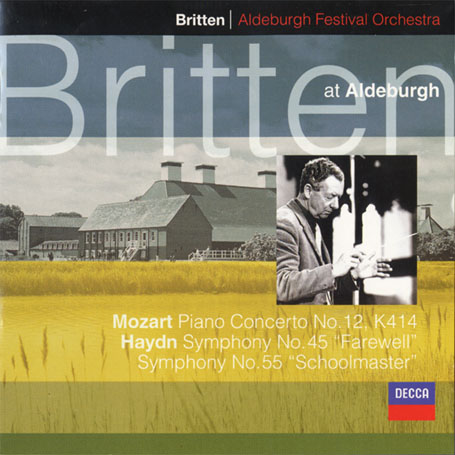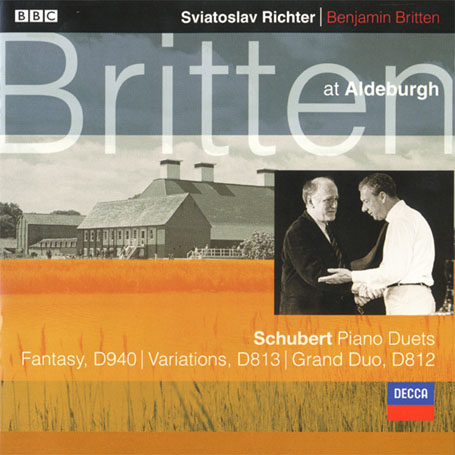Haydn Symphonies Nos 45 & 55; Mozart Piano Concerto No12
Live recordings from the Jubilee Hall, Aldeburgh in June 1956. From Decca a LW5294 (7/57), b LXT5312 (7/57
View record and artist detailsRecord and Artist Details
Composer or Director: Joseph Haydn, Wolfgang Amadeus Mozart
Label: Decca
Magazine Review Date: 8/2000
Media Format: CD or Download
Media Runtime: 72
Mastering:
DDD
Catalogue Number: 458 869-2DM

Tracks:
| Composition | Artist Credit |
|---|---|
| Concerto for Piano and Orchestra No 12 |
Wolfgang Amadeus Mozart, Composer
Benjamin Britten, Piano English Chamber Orchestra Wolfgang Amadeus Mozart, Composer |
| Symphony No. 55, 'Schoolmaster' |
Joseph Haydn, Composer
Benjamin Britten, Conductor English Chamber Orchestra Joseph Haydn, Composer |
| Symphony No. 45, 'Farewell' |
Joseph Haydn, Composer
Benjamin Britten, Conductor English Chamber Orchestra Joseph Haydn, Composer |
Composer or Director: Franz Schubert
Label: Decca
Magazine Review Date: 8/2000
Media Format: CD or Download
Media Runtime: 75
Mastering:
ADD
Catalogue Number: 466 822-2DM

Tracks:
| Composition | Artist Credit |
|---|---|
| Fantasie |
Franz Schubert, Composer
Benjamin Britten, Piano Franz Schubert, Composer Sviatoslav Richter, Piano |
| (8) Variations |
Franz Schubert, Composer
Benjamin Britten, Piano Franz Schubert, Composer Sviatoslav Richter, Piano |
| Sonata for Piano Duet, 'Grand Duo' |
Franz Schubert, Composer
Benjamin Britten, Piano Franz Schubert, Composer Sviatoslav Richter, Piano |
Composer or Director: Wolfgang Amadeus Mozart
Label: Decca
Magazine Review Date: 8/2000
Media Format: CD or Download
Media Runtime: 77
Mastering:
ADD
Catalogue Number: 466 820-2DM

Tracks:
| Composition | Artist Credit |
|---|---|
| Symphony No. 41, "Jupiter" |
Wolfgang Amadeus Mozart, Composer
Benjamin Britten, Conductor English Chamber Orchestra Wolfgang Amadeus Mozart, Composer |
| Symphony No. 39 |
Wolfgang Amadeus Mozart, Composer
Benjamin Britten, Conductor English Chamber Orchestra Wolfgang Amadeus Mozart, Composer |
| Si mostra la sorte |
Wolfgang Amadeus Mozart, Composer
Benjamin Britten, Conductor English Chamber Orchestra Peter Pears, Tenor Wolfgang Amadeus Mozart, Composer |
| Per pietà, non ricercate |
Wolfgang Amadeus Mozart, Composer
Benjamin Britten, Conductor English Chamber Orchestra Peter Pears, Tenor Wolfgang Amadeus Mozart, Composer |
Composer or Director: Dmitri Shostakovich, Mstislav Rostropovich, Frank Bridge, Leoš Janáček
Label: Decca
Magazine Review Date: 8/2000
Media Format: CD or Download
Media Runtime: 74
Mastering:
ADD
Catalogue Number: 466 823-2DM

Tracks:
| Composition | Artist Credit |
|---|---|
| Sonata for Cello and Piano |
Dmitri Shostakovich, Composer
Benjamin Britten, Piano Dmitri Shostakovich, Composer Mstislav Rostropovich, Composer |
| (7) Romances on Verses by Alexander Blok |
Dmitri Shostakovich, Composer
Benjamin Britten, Piano Dmitri Shostakovich, Composer Emanuel Hurwitz, Violin Galina Vishnevskaya, Soprano Mstislav Rostropovich, Composer |
| Pohádka (Fairy Tale) |
Leoš Janáček, Composer
Benjamin Britten, Piano Leoš Janáček, Composer Mstislav Rostropovich, Composer |
| Phantasy |
Frank Bridge, Composer
Benjamin Britten, Piano Frank Bridge, Composer Martin Lovett, Cello Norbert Brainin, Violin Peter Schidlof, Viola |
Composer or Director: Johann Sebastian Bach, Henry Purcell
Label: Decca
Magazine Review Date: 8/2000
Media Format: CD or Download
Media Runtime: 79
Mastering:
ADD
Catalogue Number: 466 819-2DM

Tracks:
| Composition | Artist Credit |
|---|---|
| Cantata No. 151, 'Süsser Trost, mein Jesus kommt |
Johann Sebastian Bach, Composer
Benjamin Britten, Conductor English Chamber Orchestra Heather Harper, Soprano Helen Watts, Contralto (Female alto) Johann Sebastian Bach, Composer John Shirley-Quirk, Baritone Peter Pears, Tenor Wandsworth School Boys' Choir |
| Cantata No. 102, 'Herr, deine Augen sehen nach dem |
Johann Sebastian Bach, Composer
Aldeburgh Festival Singers Benjamin Britten, Conductor Dietrich Fischer-Dieskau, Baritone English Chamber Orchestra Janet Baker, Mezzo soprano Johann Sebastian Bach, Composer Peter Pears, Tenor |
| Birthday Ode, 'Celebrate this festival' |
Henry Purcell, Composer
Ambrosian Singers Benjamin Britten, Conductor English Chamber Orchestra Heather Harper, Soprano Henry Purcell, Composer James Bowman, Alto John Shirley-Quirk, Baritone Josephine Veasey, Mezzo soprano Peter Pears, Tenor |
Composer or Director: Franz Schubert, Wolfgang Amadeus Mozart, Claude Debussy
Label: Legends
Magazine Review Date: 8/2000
Media Format: CD or Download
Media Runtime: 78
Mastering:
ADD
Catalogue Number: 466 821-2DM

Tracks:
| Composition | Artist Credit |
|---|---|
| Sonata for Keyboard Duet |
Wolfgang Amadeus Mozart, Composer
Benjamin Britten, Piano Sviatoslav Richter, Piano Wolfgang Amadeus Mozart, Composer |
| Sonata for 2 Keyboards |
Wolfgang Amadeus Mozart, Composer
Benjamin Britten, Piano Sviatoslav Richter, Piano Wolfgang Amadeus Mozart, Composer |
| Divertissement |
Franz Schubert, Composer
Benjamin Britten, Piano Franz Schubert, Composer Sviatoslav Richter, Piano |
| En blanc et noir |
Claude Debussy, Composer
Benjamin Britten, Piano Claude Debussy, Composer Sviatoslav Richter, Piano |
Author: Edward Greenfield
In Haydn’s Farewell Symphony he brings out the Sturm und Drang drama of the piece, the implied tragedy of the minor-key writing, with dynamic contrasts underlined. His speeds in the last two movements are fresh and brisk – remarkably so for the period – relaxing for the Adagio epilogue. That is so beautifully timed over the departure of one player after another that the very end, with only two violins left, inspires laughter. The Schoolmaster is strongly characterised too, with brisk Allegros and with high dynamic contrasts wittily pointed. The offbeat, mid-air ending of the finale is so delectably timed, that – as in the Farewell – the amusement of the audience is clearly audible.
Directing the ECO from the keyboard, Britten is just as distinctive in the Mozart ‘little’ A major Piano Concerto, K 414. It is rare for him even in Aldeburgh to put himself forward as soloist in a concerto, but this is a winningly spontaneous performance, with Britten, light and sparkling, leading his players on at challengingly fast speeds in the outer movements, often pressing ahead of the beat. The central slow movement, with Britten similarly magnetic, is by contrast warmly expressive at a slow tempo. Here more than in the Haydn the close, dry mono recording gives the violins an acid edge, but the concentration of the performance makes one quickly forget that.
Both of the Mozart symphonies on the second disc were recorded by BBC engineers, but only the Jupiter was done live at the Festival. By 1966 the BBC engineers were recording in stereo, and the warm acoustic of Blythburgh Church proves far more sympathetic than Jubilee Hall, even if the violins are on the thin side. No 39 and the two concert arias were recorded at the time of the Festival in 1952, but in a BBC studio. The mono sound is clear and well balanced, so that the timpani in the slow introduction to the symphony is crisply focused. Broadly, Britten’s interpretations follow his usual pattern with expressively moulded slow movements set against outer movements on the brisk side. Aptly, he is more relaxed in No 39 than in the Jupiter, which is above all strong and direct, bringing out the power of the writing in the first movement and finale, with expositions repeated – though not the second half of the finale. The studio acoustic does not help Pears in the two arias, with his vibrato exaggerated, though the poise and stylishness of the singing are a delight.
The disc of Bach and Purcell offers BBC recordings from three different sources, with only the Bach Cantata No 102,
The excellent notes of Philip Reed, formerly staff musicologist at the Britten-Pears library in Aldeburgh, not only analyse Britten’s interpretations of all three works, but give valuable background information about the ECO soloists involved, notably the flautist, Richard Adeney, the oboist, Peter Graeme, and the trumpeter, Philip Jones (in the Purcell), who are all outstanding. This account of the 1693 Purcell Birthday Ode, Celebrate this festival, a happy choice, is taken from the concert which inaugurated the Queen Elizabeth Hall in March 1967.
It was also the London debut of the already very distinctive countertenor James Bowman. Harper is again superb, as is John Shirley-Quirk, with Josephine Veasey firm and clear in her minor-key aria with its tricky ornamentation. Peter Pears is the constant among the soloists, wonderfully assured in each work, even though the juxtaposition of Bach and Purcell brings out the extra ease he has in Purcell, partly because the vocal figuration often anticipates Britten’s own music. Any discrepancies in the sound have been well ironed out.
Most cherishable of all in this batch is the disc of Britten and Richter in Schubert, arguably the two greatest piano duets ever written. It was an inspired partnership, devised for the Aldeburgh Festival in 1964 and 1965, resulting in electrically intense performances. In both the Grand Duo and the F minor Fantasie, recorded in Jubilee Hall in 1965, they favour fast speeds, which yet allow crisply sprung rhythms and warmly lyrical phrasing.
Britten, playing secondo, explained to me years later when I asked him about this performance, what a problem he had achieving full expressiveness with his right hand, as in the warmly lyrical second subjects. The problem was that Richter, unused to having another player at a single keyboard, so splayed out his left elbow that he kept getting in the way. You would hardly know that from the results, which are not just expressive but phenomenally crisply articulated. The Variations, which come as a welcome supplement, were recorded a year earlier in the Parish Church, again in clear, immediate stereo sound.
The other disc of Richter and Britten in duet is more varied, devoted as it is to three composers especially close to both artists. Their account of the Schubert Divertissement – labelled Andantino varie – comes from the same Jubilee Hall concert as the Fantasie and Grand Duo, a charming trifle which in their hands reveals deeper expression.
Characteristically, the outer movements of the two Mozart works are played at phenomenal speeds – that of the finale of K448 is almost beyond belief, but the articulation is wonderfully clean. The sparkle of those movements is then set against broad expressive treatment in the two slow movements. It is good to find the scale of the piano-duet Sonata K521 reinforced by the observance of every single repeat, including the second half of the first movement, and with minor-key passages given heightened intensity in all three movements. The elusiveness of late Debussy then inspires a performance of dream-like fantasy, as though the notes are being spontaneously created.
That improvisational quality marks all the playing on the Shostakovich, Janaeek and Bridge disc, where Rostropovich is Britten’s principal partner. The hushed intensity in the Shostakovich Sonata, a performance of high contrasts, takes the work on to a new plane, and the wayward, offbeat element in the Janaeek similarly sparks off inspired playing. Shostakovich’s Blok Romances, recorded in 1968, the year after they were written, are strongly characterised, too, by all four artists, not just Vishnevskaya as soloist, but by the violinist, Emanuel Hurwitz. The work itself, with each song bringing a different instrumental grouping, seems perfectly designed for Aldeburgh and its corporate music-making as inspired by Britten.
In some ways most remarkable of all is the account of the Bridge Phantasy Quartet with Britten joined by members of the Amadeus Quartet, another performance of high contrasts, with the distinctive layout prescribed for the Cobbett Prize given perfect logic. Considering the quality of the music-making on all these discs, the flaws that inevitably occur in live performance are of no moment whatever.'
Discover the world's largest classical music catalogue with Presto Music.

Gramophone Digital Club
- Digital Edition
- Digital Archive
- Reviews Database
- Full website access
From £8.75 / month
Subscribe
Gramophone Full Club
- Print Edition
- Digital Edition
- Digital Archive
- Reviews Database
- Full website access
From £11.00 / month
Subscribe
If you are a library, university or other organisation that would be interested in an institutional subscription to Gramophone please click here for further information.





